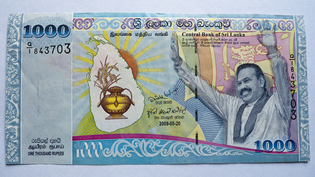Electricity and fuel prices have shot up as Sri Lanka’s economy adjusts to the sudden drop in the value of the rupee after the Central Bank acceded to IMF pressure and abandoned – for now - its long standing policy of artificially propping up the local currency.
Diesel and kerosene prices rose 36 and 49 per cent respectively whilst electricity rates for domestic consumers are to rise by 40 per cent. Bakeries are threatening to increase the price of bread, a staple - especially for the working poor.
In the past two weeks the rupee has lost 5.7 per cent of its value against the US dollar. Consequently the prices of fuel and other imported commodities have risen.
At the same, the Central Bank is finally signalling an end to cheap credit from Sri Lanka’s increasingly state controlled banks – another key demand of the IMF.
Cheap state directed credit was an important factor in fuelling import demand - see our earlier post here.
These changes will hit hard President Mahinda Rajapakse’s support base – namely the middle and lower middle class, urban and rural voters in the Sinhala majority areas.
The UNP is already talking of an anti UPFA alliance with the TNA and JVP. However, economic difficulties may strengthen rather than undermine Rajapakse’s impeccable Sinhala nationalist credentials.

